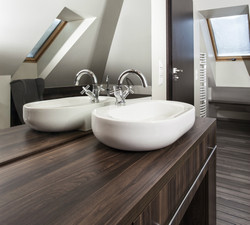Wood-plastic composite for bath furniture
Wood products used for furniture making fall into two categories: high-quality natural wood and low-quality composites. The first are expensive and require coatings, while the second are cheap, but not strong or durable. The EU-funded LIMOWOOD(opens in new window) (Advanced wood plastic composite material for the production of bath furniture resistant to moisture and free of coatings) project was established to develop a WPC that is not only affordable and strong, but also resistant to water, fungi and bacteria. Researchers developed a WPC made from a recycled thermoplastic polymer and natural recycled reinforcing particles derived from wood and contained in a polymer matrix. The result is a material that is lighter than current wood-based panels, making the product cheaper to transport. It also has a good aesthetic finish, which resembles natural wood but without surface coatings or adhesives; therefore, no polluting volatile organic compounds (VOCs) are released into the environment. LIMOWOOD has enabled participating small and medium-sized enterprises (SMEs) to become more competitive in the bath furniture sector. It has also put these SMEs in a better position to face current economic, technological, environmental and legislative demands. They will be able to provide a high-performance material based on recycled materials, free of formaldehyde based adhesives with a competitive price. Forecasted sales are around EUR 64 million over 5 years following exploitation of the project's results. Savings of more than EUR 120 million are also estimated due to the reduction of imports from outside Europe. Furthermore, there will be a reduction in wood waste, VOC emissions and work-related diseases, and the creation of new jobs.







